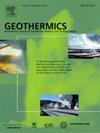非常高渗透率地热井温度瞬态分析:数值模拟方法
IF 3.5
2区 工程技术
Q3 ENERGY & FUELS
引用次数: 0
摘要
地热井测试通常在等温条件下分析一系列注入或生产步骤的压力响应。然而,井下工具也记录了井的温度响应。近年来,由于传感器和计算工具的改进,温度瞬态分析(TTA)引起了人们的关注,可以提供有关油藏和井筒的额外信息。这项工作考察了一个独特的地热储层,其特征是一个高度裂缝渗透带,在完井测试期间呈现最小的压力响应。然而,在整个注入衰减测试过程中,温度响应显示出明显的衰减和累积。我们尝试使用数值压力瞬态分析(PTA)来分析压力响应及其导数,但由于瞬态压力变化较小,因此没有得到合理的结果。然后,我们通过更新的数值模拟框架,利用地热TTA对温度响应进行了分析。采用这种新方法,可以通过一系列时间步骤对试井数据进行温度分析,从而计算出储层参数。地热TTA在PTA不足时显示出补充PTA的潜力。对于非常高渗透率的井,应包括TTA,以获得可靠的储层参数。本文章由计算机程序翻译,如有差异,请以英文原文为准。
Temperature transient analysis of a very high-permeability geothermal well: A numerical modelling approach
Geothermal well tests usually analyse the pressure response throughout a series of injection or production steps assuming isothermal conditions. However, the downhole tool also records the temperature response of the well. In recent years, temperature transient analysis (TTA) has attracted attention because of the improvement of sensors and computational tools, providing additional information about the reservoir and wellbore. This work examines a unique geothermal reservoir characterised by a highly fractured permeable zone, presenting a minimal pressure response during well (completion) testing. However, the temperature response shows a noticeable falloff and buildup throughout the injection-falloff test. We attempted to analyse the pressure response and its derivative using the numerical pressure transient analysis (PTA), but this did not yield reasonable results due to the small change in the transient pressure. Then, we included the analysis of temperature response utilising geothermal TTA through an updated numerical modelling framework. Employing this new approach made it possible to calculate the reservoir parameters by including temperature analysis through a series of time steps to examine the well-test data. Geothermal TTA showed the potential to complement PTA when insufficient. The examination of wells with very high permeability should include TTA to obtain reliable reservoir parameters.
求助全文
通过发布文献求助,成功后即可免费获取论文全文。
去求助
来源期刊

Geothermics
工程技术-地球科学综合
CiteScore
7.70
自引率
15.40%
发文量
237
审稿时长
4.5 months
期刊介绍:
Geothermics is an international journal devoted to the research and development of geothermal energy. The International Board of Editors of Geothermics, which comprises specialists in the various aspects of geothermal resources, exploration and development, guarantees the balanced, comprehensive view of scientific and technological developments in this promising energy field.
It promulgates the state of the art and science of geothermal energy, its exploration and exploitation through a regular exchange of information from all parts of the world. The journal publishes articles dealing with the theory, exploration techniques and all aspects of the utilization of geothermal resources. Geothermics serves as the scientific house, or exchange medium, through which the growing community of geothermal specialists can provide and receive information.
 求助内容:
求助内容: 应助结果提醒方式:
应助结果提醒方式:


